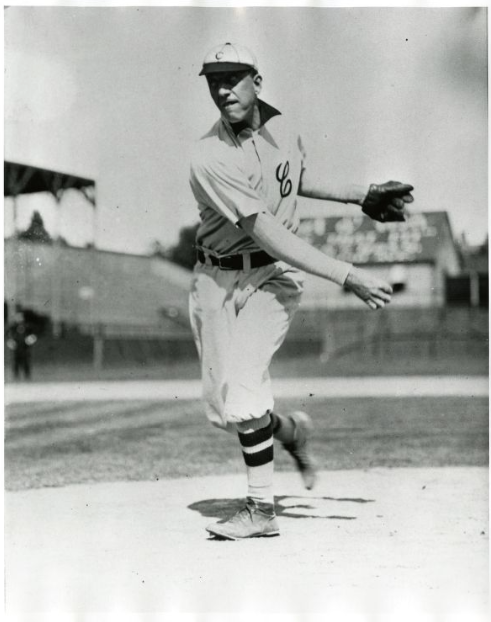JOSS, ADRIAN "ADDIE" (12 Apr. 1880-14 Apr. 1911), major-league baseball pitcher for Cleveland in the American League between 1902-10, whose career earned-run average of 1.88 per 9-inning game is the 2d-lowest in major-league history, was born in Juneau, Wis., son of Jacob and Theresa Joss. Unlike many early ball players, Joss attended college, both at St. Mary's College and at the University of Wisconsin. He played for the Toledo Mud Hens 2 years; then his contract was sold to the Cleveland Blues.
Joss began his major-league career on 26 Apr. 1902 pitching a 1-hit shutout against St. Louis. From 1905-08, Joss won over 20 games a season, topped by 27 wins in 1907. His best season was unarguably 1908, in which his record stood at 24-11 with a 1/16 ERA. He threw nine shutouts, and walked just thirty batters in 325 innings. 2 Oct. 1908 marked the fourth perfect game in history, which Joss threw against the Chicago White Sox pitcher, Ed Walsh. On 20 Apr. 1910, he pitched another perfect game against Chicago. He completed a remarkable 90% of all games started in his career, with 160 wins - 45 of which were shutouts - and 97 losses. In that time he recorded 920 strikeouts.
Joss became well known for his unconventional windup, which started with his back to the batter. Hall of Fame player, Bobby Wallace said that “Joss sort of hid the ball on you. One moment, you’d be squinting at a long, graceful windup and the next instant, out of nowhere, the ball was hopping across the plate – and a lot of us standing flat-footed with our bat glued to our shoulders.” In his nine seasons in the majors, Joss never had a losing season.
For several seasons, he was a sportswriter for the Toledo News Bee. His writings were extremely popular, and greatly increased the circulation of the paper. His popularity as a player and a writer provided him negotiating power for his 1907 contract with the Cleveland Naps, and his salary that year was $4,000; almost twice the average ball player salary. Joss would later write for the CLEVELAND PRESS as well, and covered the World Series for both papers from 1907-1909. His college education was often credited to his success as a writer. He was also a skilled inventor, and developed an electronic scoreboard known as the Joss Indicator, which kept track of balls and strikes when it was installed at LEAGUE PARK.
Joss died of complications from tubercular meningitis. His funeral was one of the largest in Toledo, Ohio history; noted ex-baseball player and evangelist Billy Sunday preached the funeral message. Cleveland's home opener that season was postponed due to the funeral. The Baseball Hall of Fame rules state a player must appear in a minimum of 10 seasons to be considered for entrance, but in 1978 the Committee on Veterans waived the rule for Joss, and the pitcher was voted into the Hall of Fame at Cooperstown, N.Y. Joss married Lillian Shinivar on 11 Oct. 1902. They had 2 children, Norman and Ruth.
Arguably the first ever "All Star" game was organized by the Cleveland Naps in Joss' honor. The top players in the American League formed a team to take on Cleveland at League Park, with the proceeds of the event going to Joss' widow. The opposing team included baseball legends Ty Cobb, John "Home Run" Baker, Tris Speaker, and "Smoky Joe" Wood. The game was played 25 July 1911, and although the Naps lost 5-3, the event raised $12,914.
Meghan Schill



